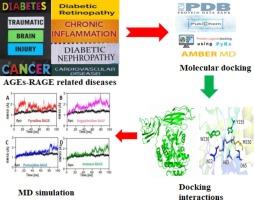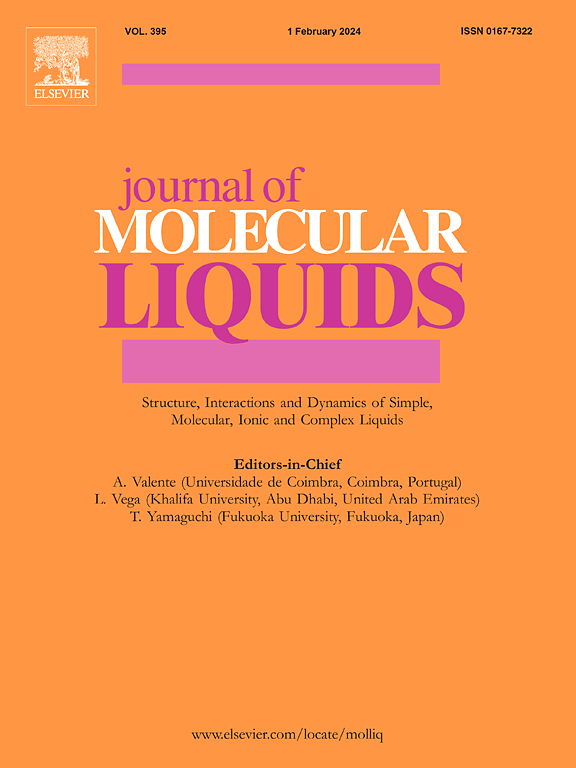利用分子对接和 MD 模拟方法阐明高级糖化终产物与 RAGE 的相互作用:糖尿病及其相关并发症的强效疗法的意义
IF 5.3
2区 化学
Q2 CHEMISTRY, PHYSICAL
引用次数: 0
摘要
糖尿病是一项全球性健康挑战,在全球死亡率中排名第三。糖尿病介导的高级糖化终产物(AGEs)与高级糖化终产物受体(RAGE)相关联,导致慢性糖尿病及其并发症、炎症、癌症和神经退行性疾病。AGEs-RAGE复合物之间的结合机制背后的信息仍然难以捉摸。在目前的研究中,我们利用先进的计算方法揭示了 AGEs-RAGE 分子内相互作用导致的多种疾病。我们通过蛋白质配体对接表征了 AGEs-RAGE 的相互作用,并进一步进行了分子动力学(MD)模拟,以评估 AGEs-RAGE 复合物的稳定性。随后,几个残基成为 AGEs-RAGE 复合物形成的关键。此外,MD 模拟对蛋白质配体复合物的结构运动、稳定性和构象动力学提供了宝贵的见解。我们的研究结果凸显了对糖尿病及其相关并发症中 AGEs-RAGE 复合物形成的分子机制的新认识,并简化了药物发现过程。本文章由计算机程序翻译,如有差异,请以英文原文为准。

Elucidating the interactions of advanced glycation end products with RAGE, employing molecular docking and MD simulation approaches: Implications of potent therapeutic for diabetes and its related complications
Diabetes mellitus is a global health challenge, ranking third among the mortality rates globally. Diabetic-mediated Advanced glycation end products (AGEs) associated with Receptor for Advanced Glycation End-products (RAGE) contribute to chronic diabetes and its complications, inflammatory, cancer, and neurodegenerative disorders. The information behind the binding mechanisms between AGEs-RAGE complexes remains elusive. In the current study, we used advanced computational approaches to reveal the intramolecular interactions of AGEs-RAGE which leads to multiple diseases. We have characterized AGEs-RAGE interactions by protein–ligand docking and molecular dynamic (MD) simulations were further conducted to evaluate the AGEs-RAGE complex stability. Subsequently, several residues emerged as pivotal in AGEs-RAGE complex formation. Further, MD simulation provides valuable insights into structural movements, stability, and conformational dynamics of protein–ligand complexes. Our findings underscore new insights into molecular mechanisms of AGEs-RAGE complex formation in diabetes and its related complications and the ease of the drug discovery process.
求助全文
通过发布文献求助,成功后即可免费获取论文全文。
去求助
来源期刊

Journal of Molecular Liquids
化学-物理:原子、分子和化学物理
CiteScore
10.30
自引率
16.70%
发文量
2597
审稿时长
78 days
期刊介绍:
The journal includes papers in the following areas:
– Simple organic liquids and mixtures
– Ionic liquids
– Surfactant solutions (including micelles and vesicles) and liquid interfaces
– Colloidal solutions and nanoparticles
– Thermotropic and lyotropic liquid crystals
– Ferrofluids
– Water, aqueous solutions and other hydrogen-bonded liquids
– Lubricants, polymer solutions and melts
– Molten metals and salts
– Phase transitions and critical phenomena in liquids and confined fluids
– Self assembly in complex liquids.– Biomolecules in solution
The emphasis is on the molecular (or microscopic) understanding of particular liquids or liquid systems, especially concerning structure, dynamics and intermolecular forces. The experimental techniques used may include:
– Conventional spectroscopy (mid-IR and far-IR, Raman, NMR, etc.)
– Non-linear optics and time resolved spectroscopy (psec, fsec, asec, ISRS, etc.)
– Light scattering (Rayleigh, Brillouin, PCS, etc.)
– Dielectric relaxation
– X-ray and neutron scattering and diffraction.
Experimental studies, computer simulations (MD or MC) and analytical theory will be considered for publication; papers just reporting experimental results that do not contribute to the understanding of the fundamentals of molecular and ionic liquids will not be accepted. Only papers of a non-routine nature and advancing the field will be considered for publication.
 求助内容:
求助内容: 应助结果提醒方式:
应助结果提醒方式:


